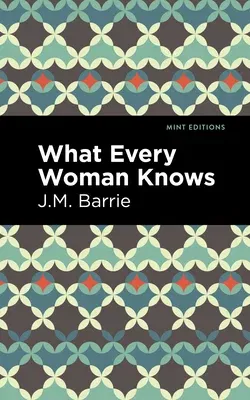What Every Woman Knows (1908) is a play by J. M. Barrie. It ran for
384 performances at the Duke of York's Theatre in London and was
produced on Broadway as well, making it one of the most successful plays
of the year. Inspired by the women's suffrage movement, Barrie sought to
explore the intersection of gender and class in Scottish aristocratic
society. Adapted numerous times for film and consistently revived on
stage, What Every Woman Knows is an enduring work of English theatre
by an author whose reputation as the creator of Peter Pan has largely
overshadowed the rest of his brilliant career. Behind every great man,
an even better woman makes his success possible. In J. M. Barrie's
masterful play, a Scottish family worried for their daughter's future
seizes the chance to marry her off to a promising young man. Having
discovered a young university student in their vast library, they offer
to pay for his education if he agrees to take Maggie's hand. Left with
no real choice in the matter, John Shand marries into the Wylie family
and attempts to launch a career in politics. As his reputation
grows--due in no small part to his wife's hard work--Shand begins to
forget his impoverished roots, dreaming instead of a future all his own.
Funny and deeply critical of the institution of marriage, What Every
Woman Knows is a story of romance, ambition, and humility from a
legendarily gifted Scottish storyteller. With a beautifully designed
cover and professionally typeset manuscript, this edition of J. M.
Barrie's What Every Woman Knows is a classic work of Scottish
literature reimagined for modern readers.


